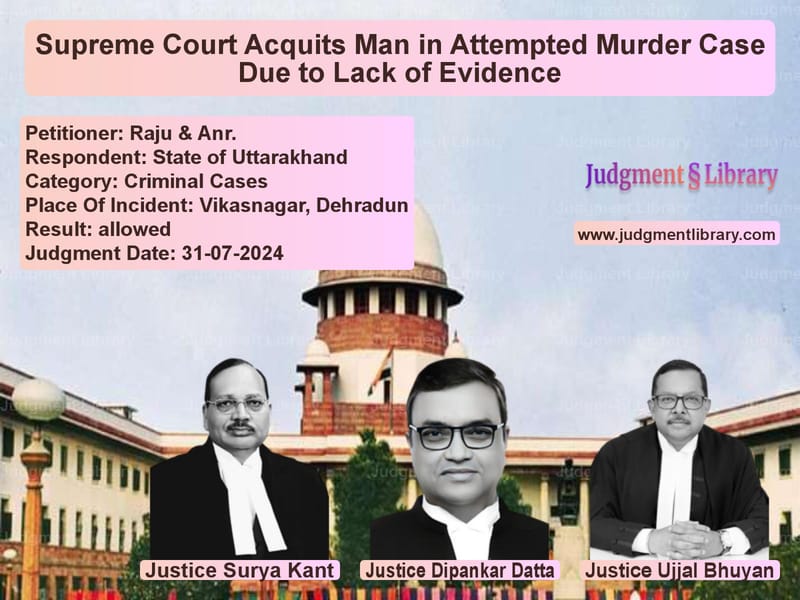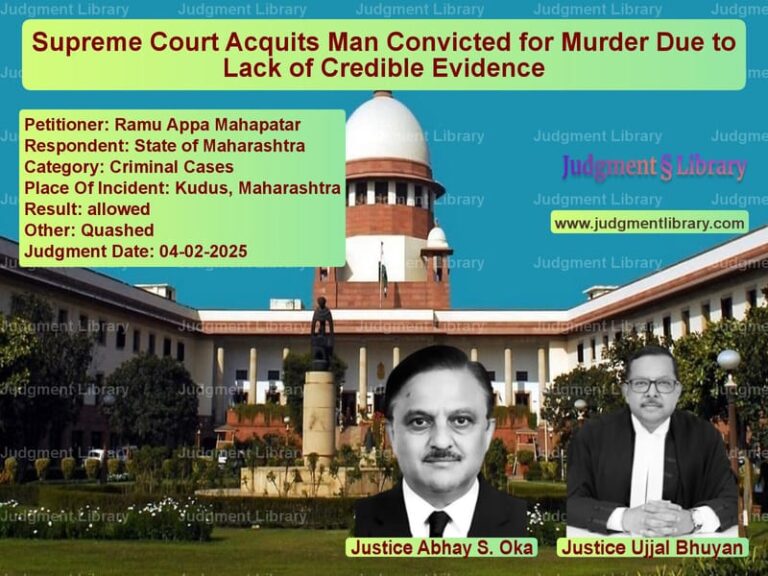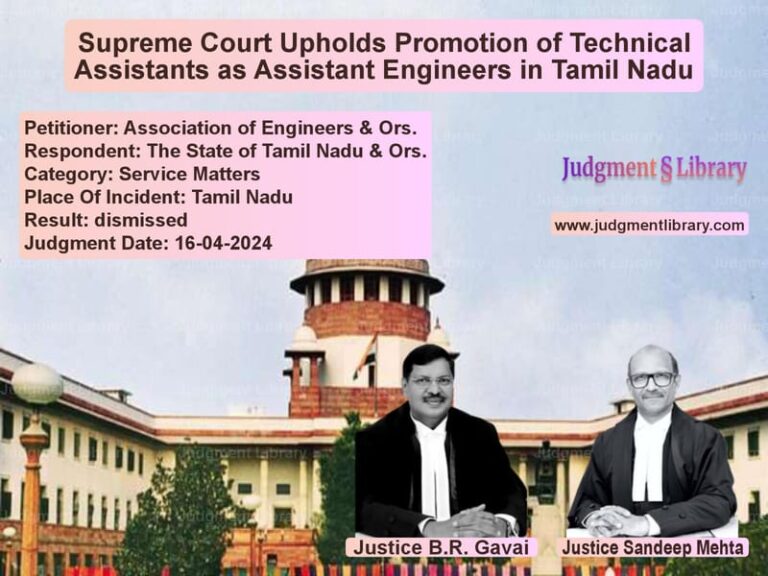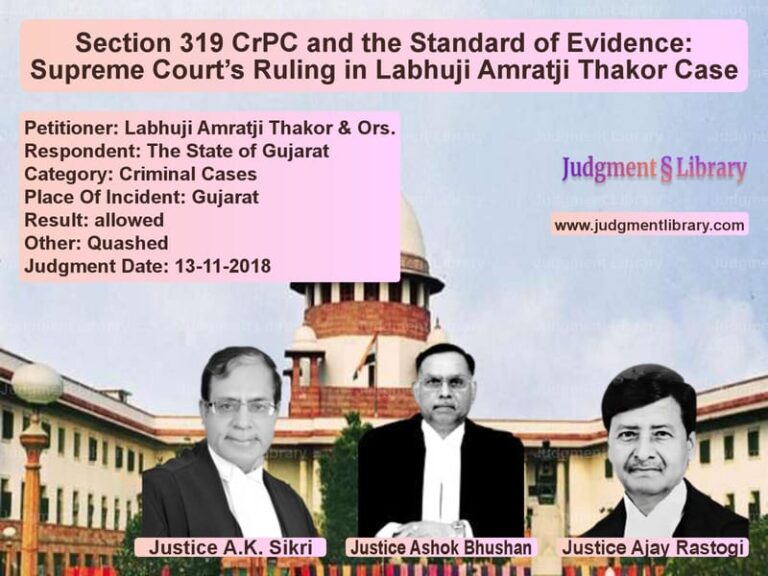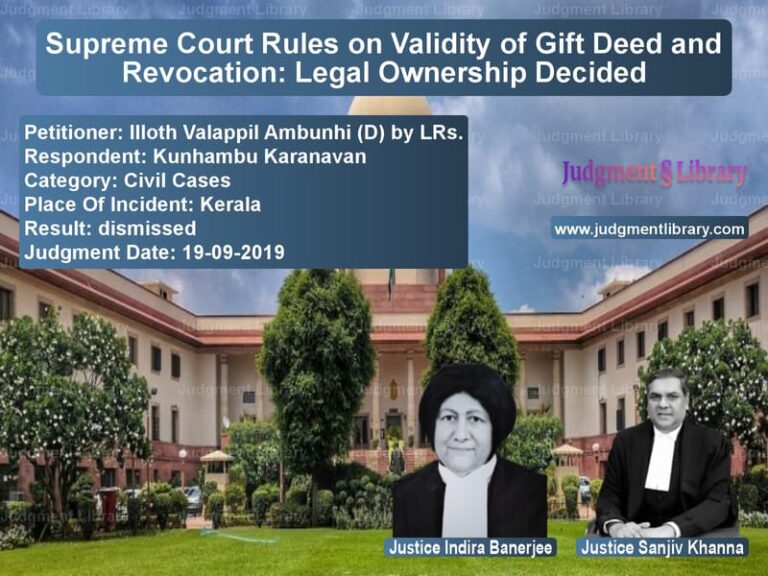Supreme Court Acquits Man in Attempted Murder Case Due to Lack of Evidence
The case of Raju & Anr. vs. State of Uttarakhand revolves around the conviction of the appellants under Section 307 of the Indian Penal Code (IPC) for an alleged knife attack on two individuals in 1994. The Supreme Court, after examining the inconsistencies in witness testimonies and gaps in the prosecution’s evidence, overturned the High Court’s decision and acquitted the accused. This judgment highlights the importance of a fair trial and the necessity of corroborative evidence in serious criminal cases.
Background of the Case
The incident occurred on the night of May 7, 1994, in Vikasnagar, Dehradun. The complainant, Farzan Ali, filed an FIR alleging that his son, Imran, along with his friends Mathu, Irfan, and Jakir, was attacked while returning home from a late-night cinema show. The accused, Raju and Bhola Ram, were alleged to have used knives, while two other co-accused, Manoj and Suresh, were armed with lathis.
The victims, Imran and Mathu, were reportedly assaulted with knives and lathis, leaving them critically injured. Jakir and Irfan, who attempted to intervene, also sustained injuries. The complainant, Farzan Ali, was not an eyewitness but based his FIR on the narration provided by his son’s friends.
Read also: https://judgmentlibrary.com/supreme-court-acquits-man-due-to-procedural-lapses-in-murder-conviction/
The Trial Court, after evaluating witness testimonies, medical evidence, and statements recorded under Section 313 of the Code of Criminal Procedure (CrPC), acquitted all accused in 1995 due to lack of sufficient evidence. However, the State of Uttarakhand appealed the acquittal, and the High Court partially overturned the decision in 2009, convicting Raju and Bhola Ram under Section 307 IPC and sentencing them to seven years of rigorous imprisonment.
Petitioner’s Arguments
The counsel for the appellants argued that:
- The High Court failed to appreciate the contradictions in the prosecution’s evidence.
- The complainant, Farzan Ali, was not an eyewitness, and his FIR was based on hearsay.
- Key witnesses, Jakir and Irfan, who allegedly witnessed the attack, were never examined by the prosecution.
- Mathu, one of the injured witnesses, admitted during cross-examination that he could not clearly identify who inflicted the stab wounds.
- Medical evidence was inconsistent with the nature of injuries described by the witnesses.
- The prosecution failed to establish a clear motive for the alleged attack.
Respondent’s Arguments
The State of Uttarakhand defended the High Court’s conviction on the following grounds:
- The injured witness, Mathu, had testified that the appellants were armed with knives and inflicted injuries.
- Medical experts confirmed that the injuries were caused by sharp objects, corroborating the prosecution’s claims.
- The accused had fled the scene, indicating guilt.
- The High Court rightly overturned the Trial Court’s acquittal based on available evidence.
Supreme Court’s Observations
The Supreme Court critically examined the inconsistencies in the prosecution’s case and noted several key issues:
“The conviction under Section 307 IPC requires the prosecution to prove both intent and an overt act. In the present case, the evidence on record does not conclusively establish that the appellants intended to cause death.”
The Court highlighted the following discrepancies:
- Contradictory Witness Statements: Mathu and Imran gave conflicting accounts of the attack, particularly about who was armed with knives and lathis.
- Non-Examination of Crucial Witnesses: The prosecution failed to produce Jakir and Irfan, the only two neutral eyewitnesses.
- Medical Inconsistencies: The injuries described by the witnesses did not match the forensic evidence.
- Hearsay FIR: The complainant was not an eyewitness and his report was based on secondary accounts.
- Absence of Motive: There was no history of animosity between the accused and the victims, making the prosecution’s claim of a sudden attack questionable.
Final Verdict
The Supreme Court ruled in favor of the appellants and acquitted them, stating:
“The evidence presented by the prosecution is insufficient to uphold the conviction under Section 307 IPC. The benefit of doubt must go to the accused.”
The Court set aside the High Court’s judgment and restored the Trial Court’s acquittal.
Implications of the Judgment
This ruling reaffirms several critical legal principles:
- Necessity of Corroborative Evidence: A conviction cannot be based on contradictory testimonies without independent verification.
- Hearsay Evidence is Insufficient: The FIR must be supported by direct eyewitness testimony.
- Prosecution’s Burden of Proof: The prosecution must prove intent and overt acts beyond reasonable doubt.
- High Court’s Review Powers: A High Court should not overturn an acquittal unless there is compelling evidence of wrongful appreciation by the Trial Court.
Conclusion
The Supreme Court’s decision in this case underscores the importance of a fair trial and the protection of the rights of the accused. By setting aside the conviction due to inconsistencies in the prosecution’s case, the Court reaffirmed the fundamental principle that every individual is presumed innocent until proven guilty beyond a reasonable doubt.
Petitioner Name: Raju & Anr..Respondent Name: State of Uttarakhand.Judgment By: Justice Surya Kant, Justice Dipankar Datta, Justice Ujjal Bhuyan.Place Of Incident: Vikasnagar, Dehradun.Judgment Date: 31-07-2024.
Don’t miss out on the full details! Download the complete judgment in PDF format below and gain valuable insights instantly!
Download Judgment: raju-&-anr.-vs-state-of-uttarakhand-supreme-court-of-india-judgment-dated-31-07-2024.pdf
Directly Download Judgment: Directly download this Judgment
See all petitions in Attempt to Murder Cases
See all petitions in Bail and Anticipatory Bail
See all petitions in Custodial Deaths and Police Misconduct
See all petitions in Juvenile Justice
See all petitions in Extortion and Blackmail
See all petitions in Judgment by Surya Kant
See all petitions in Judgment by Dipankar Datta
See all petitions in Judgment by Ujjal Bhuyan
See all petitions in allowed
See all petitions in supreme court of India judgments July 2024
See all petitions in 2024 judgments
See all posts in Criminal Cases Category
See all allowed petitions in Criminal Cases Category
See all Dismissed petitions in Criminal Cases Category
See all partially allowed petitions in Criminal Cases Category

